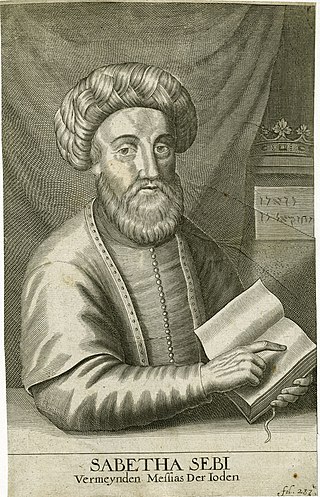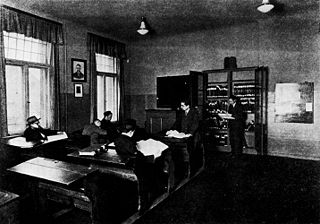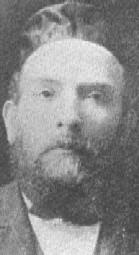
The Sabbateans were a variety of Jewish followers, disciples, and believers in Sabbatai Zevi (1626–1676), a Sephardic Jewish rabbi and Kabbalist who was proclaimed to be the Jewish Messiah in 1666 by Nathan of Gaza.

Jewish philosophy includes all philosophy carried out by Jews, or in relation to the religion of Judaism. Until modern Haskalah and Jewish emancipation, Jewish philosophy was preoccupied with attempts to reconcile coherent new ideas into the tradition of Rabbinic Judaism, thus organizing emergent ideas that are not necessarily Jewish into a uniquely Jewish scholastic framework and world-view. With their acceptance into modern society, Jews with secular educations embraced or developed entirely new philosophies to meet the demands of the world in which they now found themselves.

Yeshiva Rabbi Chaim Berlin or Yeshivas Rabbeinu Chaim Berlin is an American Haredi Lithuanian-type boys' and men's yeshiva in Brooklyn, New York.
World Agudath Israel, usually known as the Aguda, was established in the early twentieth century as the political arm of Ashkenazi Torah Judaism. It succeeded Agudas Shlumei Emunei Yisroel in 1912. Its base of support was located in Eastern Europe before the Second World War but, due to the revival of the Hasidic movement, it included Orthodox Jews throughout Europe. Prior to World War II and the Holocaust, Agudath Israel operated a number of Jewish educational institutions throughout Europe. After the war, it has continued to operate such institutions in the United States as Agudath Israel of America, and in Israel. Agudath Israel is guided by its Moetzes Gedolei HaTorah in Israel and the USA.
Jonathan Eybeschutz was a Talmudist, Halachist, Kabbalist, holding positions as Dayan of Prague, and later as Rabbi of the "Three Communities": Altona, Hamburg and Wandsbek. He is well known for his conflict with Jacob Emden in the Emden–Eybeschutz Controversy.

Yeshiva Torah Vodaas is a yeshiva in the Kensington neighborhood of Brooklyn, New York.
David Berger is an American academic, dean of Yeshiva University's Bernard Revel Graduate School of Jewish Studies, as well as chair of Yeshiva College's Jewish Studies department. He is the author of various books and essays on medieval Jewish apologetics and polemics, as well as having edited the modern critical edition of the medieval polemic text Nizzahon Vetus. Outside academic circles he is best known for The Rebbe, the Messiah, and the Scandal of Orthodox Indifference, a criticism of Chabad messianism.
Yechiel ben Joseph of Paris or Jehiel of Paris, called Sire Vives in French and Vivus Meldensis in Latin, was a major Talmudic scholar and Tosafist from northern France, father-in-law of Isaac ben Joseph of Corbeil. He was a disciple of Rabbi Judah Messer Leon, and succeeded him in 1225 as head of the Yeshiva of Paris, which then boasted some 300 students; his best known student was Meir of Rothenburg. He is the author of many Tosafot.

The Hildesheimer Rabbinical Seminary was founded in Berlin on 22 October 1873 by Rabbi Dr. Israel Hildesheimer for the training of rabbis in the tradition of Orthodox Judaism.
Charlotte Elisheva Fonrobert is a professor in the Religious Studies department of Stanford University. She specializes in Judaism, especially talmudic literature and culture. Her research interests include gender in Jewish culture, the relationship between Judaism and Christianity in Late Antiquity, the discourses of orthodoxy versus heresy, and rabbinic conceptions of Judaism with respect to Greco-Roman culture. She completed her graduate training at the Graduate Theological Union in Berkeley, CA. In 2007 she wrote the article Gender Identity In Halakhic Discourse for Jewish Women: A Comprehensive Historical Encyclopedia; this is likely the first scholarly article on the topic. In 2009, she was named to the inaugural membership of the Shalom Hartman Institute North American Scholars Circle.
Moses Hagiz was a Talmudic scholar, rabbi and writer born in Jerusalem during the time of the Old Yishuv. He was also one of the most prominent and influential Jewish leaders in 17th-century Amsterdam. During Hagiz's lifetime, there was an overall decline in rabbinic authority which was the result of migration and assimilation, and Hagiz devoted his career to restoring rabbinic authority. His most prominent talent was as a polemicist, and he campaigned ceaselessly against Jewish heresy in an attempt to unify the rabbinate.
Mordechai Yosef Leiner of Izbica known as "the Ishbitzer" (1801-1854) was a rabbinic Hasidic thinker and founder of the Izhbitza-Radzyn dynasty of Hasidic Judaism. He is best known for his work Mei Hashiloach.
Shlomo Carlebach was a German-born American Haredi rabbi and scholar.

Avraham Eliezer Alperstein was an Orthodox Rabbi, Rosh yeshiva, publisher, communal leader and exceptional Talmudic scholar. He published the first ever section of Talmud in the United States.
Yosef Hayim Yerushalmi was the Salo Wittmayer Baron Professor of Jewish History, Culture and Society at Columbia University, a position he held from 1980 to 2008.
In Jewish law, a posek is a legal scholar who determines the application of halakha, the Jewish religious laws derived from the written and Oral Torah in cases of Jewish law where previous authorities are inconclusive, or in those situations where no clear halakhic precedent exists.
Nosson Dovid Rabinowich is an American scholar of classical and medieval Jewish history former Dean of Ahavath Torah Institute in Brooklyn, New York. He is a descendant of Nathan David Rabinowich of Shidlowce and is a modern advocate of "the theory of the two Jesuses." In February 2013 he was arrested for attempting to lure a child for sex.

Zakhor: Jewish History and Jewish Memory is a non-fiction book first published in 1982 by the historian Yosef Hayim Yerushalmi (1932–2009), a professor of Jewish history at Columbia University. It consists of four lectures that Yerushalmi gave as part of the 1980 series of "Stroum Lectures in Jewish Studies", now known as the Samuel and Althea Stroum Lectures in Jewish Studies, at the University of Washington in Seattle. Harold Bloom wrote the foreword for the publication. The title, Zakhor, is the Hebrew word for remember. The New Yorker described the book as "one of the most influential works on Jewish history" since the 1950s.





